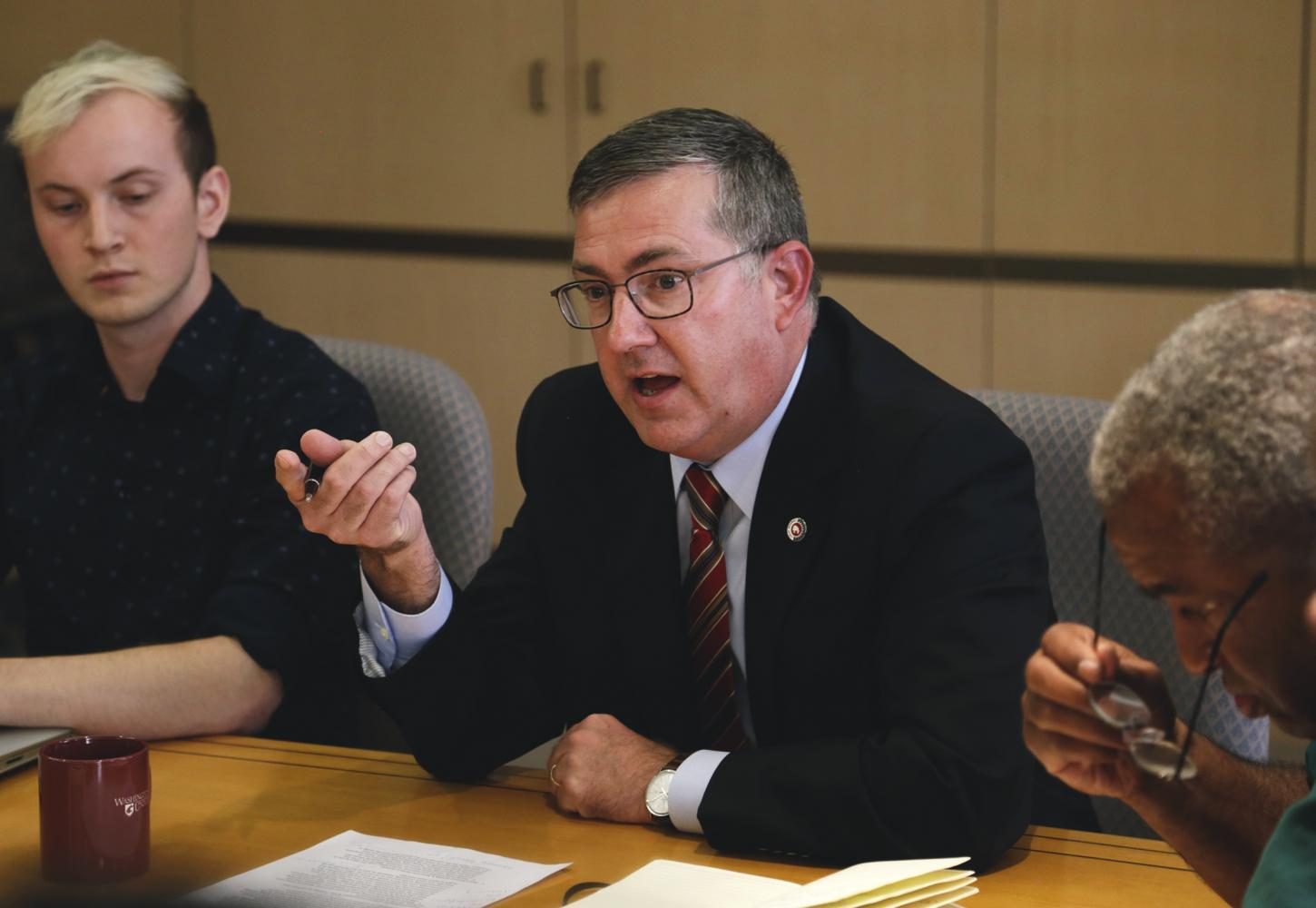President Schulz discusses sit-in demands with students
Schulz promised to address some of the student’s concerns
RYAN PUGH | The Daily Evergreen
Kirk Shultz addresses assembled students and faculty after hearing student testimonies during the first meeting addressing the Sit In demands.
August 31, 2017
Multicultural student organization leaders met with WSU President Kirk Schulz and other senior university officials to discuss ways WSU could improve campus climate, multicultural programs and representation of minority communities.
Chijioke Emeka, president of the Black Student Union, led the discussion on the student side and re-read the group’s statement and demands from a sit-in earlier this week.
“The administration cannot remain silent on the issues facing the student body,” Emeka said. “We, as students, are tired of being ignored and will no longer stand for it.”
Generic responses from the university showing support, but not taking action were not enough, she said. WSU has not taken a hard enough line combating hate speech and offenses against students of color, Emeka said.
She called on university officials to clarify the difference between free speech, hate speech and harassment.
“The policy is too vague and allows hate speech,” Emeka said.
Preventing and defining hate speech under a new policy would be difficult, due to a lack of distinction under the law, Schulz said.
“We discussed with leadership and agreed the current policy needs revision,” he said.
While Schulz said he wanted to do something to address the students’ perceived tolerance of hate speech from the administration, he did not promise they would be satisfied with the result.
“I want to make sure we get a satisfactory policy in place,” he said. “I just don’t know what that is.”
The students also wanted mandatory cultural competency training for faculty, staff and first-year students.
Students around the table shared their experiences facing discrimination, which they said could be at least partially prevented if WSU spent more time promoting cultural awareness.
Rumnik Cheema, a Multicultural Student Services mentor, said his roommate told him to stay away from him when speaking his native language on the phone. Cheema said he felt so uncomfortable in his own room that he spent much of the semester sleeping on a friend’s floor. He said his resident advisor did not do enough in reaction to the situation because he was ill-equipped to address racial discrimination.
“[More training] won’t solve the problem,” Emeka said, “but it starts an important discussion before hate manifests.”
The students were also concerned that there was a lack of support for Critical Culture, Gender and Race Studies, multicultural resource centers and faculty and staff of color.
“It’s disheartening because the campus claims to be diverse but [students] end up being each other’s counselors,” Vice President of Black Men Making a Difference, Orion Welch, said of the amount of university employees of color.
Welch said the lack of professors from minority backgrounds leaves students of color to speak up on a broad scale of issues when they are brought up in class. He also asked for classes to address race and gender issues more in-depth.
“Right now,” he said, “they are skipped over and thought of as unimportant.”
Multiple other students around the table agreed, saying the university fails to take racial issues and multicultural resource centers seriously.
In response, Schulz said he would make a list of all the resource centers to make sure none are negatively-impacted.
The group’s final point of discussion was on gender inclusivity and free menstrual products in bathrooms.
Brandon Townsend, secretary of Gender and Sexuality Alliance, said the gender-inclusive bathrooms in the CUB and the Chinook Student Center were not enough for students who need them all around campus.
“[Some students] have to spend a lot of time searching for a bathroom,” Townsend said.
Menstrual products should be provided in all bathrooms, they said, because students across the gender spectrum struggle to afford them.
“I appreciate the dialogue and I think the things you propose are reasonable,” Schulz said of the whole meeting.
Toward the end of the meeting, Board of Regents vice Chair Ron Sims praised Schulz for hearing the students concerns. He reminisced about his own stint of student activism when he was an undergraduate.
“We led an effort to close the university down over black students’ demands,” Sims said. “I felt just like you did, exactly like you did.”
He said he had never seen such willingness to address student concerns from a university president like he had from Schulz.
Schulz closed the meeting by saying he planned to sit down with the group of students again late next week with more concrete courses of action to address their concerns.
Some of the student leaders and administration officials expressed optimism on the way out of the conference room on the fourth floor of Lighty.
“I am hopeful change will be made,” Emeka said. “The time is now.”









